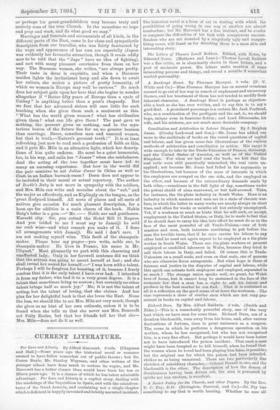Conciliation and Arbitration in Labour Disputes. By J. Stephen Jeans.
(Crosby Lockwood and Son.)—Mr. jeans has added one more to the multitude of books on the vexed questions of capital and labour, and has given some fair illustrations of the various methods of arbitration and conciliation in action. His range is wide enough to take in the Trade-Unionism of France, Germany, and the United States of America, as well as of the United Kingdom. Yet when we had read the hook, we felt that the real evils were still practically untouched, the real cures un- applied ; not because Mr. Jeans had failed in his arguments or his illustrations, but because of the mass of interests in which the employers are arrayed on the one side, and the employed on the other, and because of the extraordinary demands made by both sides,—sometimes in the full light of day, sometimes under the potent shield of aims unavowed, or but half-avowed. Take, for instance, the tin-plate industry in South Wales. Here is an industry in which masters and men are in a state of chronic war- fare, in which the latter in many works are nearly always on short time, and often for weeks or months all but entirely unemployed. Yet, if a workman so much as hints that he will seek, or accept, employment in the United States, or Italy, he is made to feel that if he should dare to carry his idea into effect he must do so in the face of the most powerful of all Trade-Unions,--one of both masters and men, both interests combining to put before the man the terrible issue, that if he once carries his labour to any other /and he need not again expect to be employed as a tin-plate worker in South Wales. There are tin-plate workers at present employed as unskilled labourers in Wales, because they tried to sell their labour in Italy, and failed. Of course this is Trade- Unionism on a small Beale, and even on that scale, one of persons who are otherwise fierce antagonists. But what hope is there of fairness and justice in the disputes of capital and labour, while this spirit can actuate both employers and employed, separated in so much P The strange union speaks well, we grant, for Welsh love of home, but it cannot long be sustained in the face of the economic law that a man has a right to sell his labour and produce in the beet market he can find. That it is sustained at all is a reflection on the good sense of at least the workmen. The case represents a class of similar ones which are not very pro- minent in books on capital and labour.






































 Previous page
Previous page